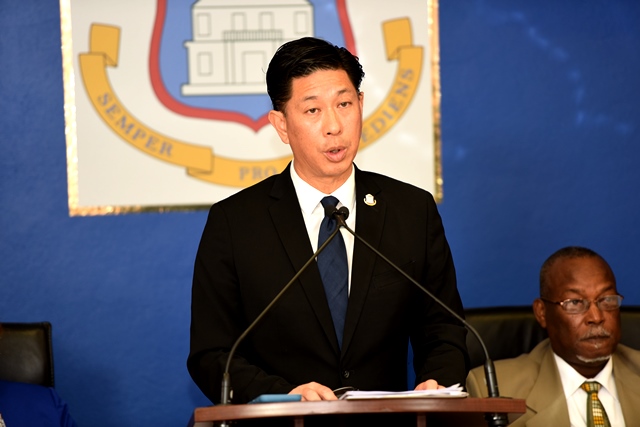PHILIPSBURG – Minister of Public Health, Social Development and Labour Emil Lee addressed members of the media in Wednesday’s, June 21, Council of Ministers Press Briefing.
He first addressed some confusion in the public about the water situation, “so I thought it’d be good to try and recap and give a little bit more clarity on the situation.”
“Number 1, the Inspectorate last night issued a press release announcing that they would be intensifying their supervision of drinking water, and that’s a release that the media should have already, so there are some points that I’m going to elaborate on a bit,” Minister Lee began.
“For the public information, the water that is distributed via GEBE is water that’s produced by a process called reverse osmosis. Seawater is taken in and goes through a process, and drinking water is produced. This is done by a company called Seven Seas. When Seven Seas produces this water, it then goes via the distribution system. The distribution system is the responsibility of GEBE. It’s stored in one of the numerous tanks you see around the island, and then from those tanks distributed to businesses and residents on the island,” the Minister explained.
“There’s legislation in place that governs the drinking water quality, more specifically the national drink water ordinance, and the national decree containing general measures on the quality of drinking water. So there is legislation that’s very specific about how the drinking water is maintained, and as Ministry of VSA, my job is to make sure that the quality of the water is safe for our people, and I want to reiterate through all of this process, the drinking water is safe to drink,” Minister Lee assured.
“I’ve gotten a number of questions on ‘is the drinking water safe to drink.’ Yes it is, but again we are obligated to comply with the law, and we are obligated to ensure that the players in the system comply with the law, and those are the different stakeholders as I just mentioned,” he further informed.
“In the drinking ordinance, there are 64 specifications for the quality of water, that if you comply with these 64 points, we would consider the water to be in compliance with the law and safe to drink. Some of those parameters are checked on different frequencies, but out of those, 15 parameters are checked on a daily basis. Again, I want to reassure the public that the water is being checked every day to ensure that it’s safe to drink,” the Minister said.
“If the inspectorate has any indications that the water has, for some reason, become unsafe to drink, a public notification will go out explaining to the public what’s happened and what they should do as precautions. And that is not the case, so these 15 parameters include microbiology,” Minister Lee further explained.
“So in other words if there’s bacteria in the water, physical characteristics of the water pressure, pH is an indication as to whether the water is acidic or alkaline, so it refers to chemical properties of the water and also looks at, for example, the chlorine levels. There are guidelines in the specifications that outline what are acceptable levels of bacteria in the water,” the Minister continued.
“Not all bacteria is harmful. So there’s harmful bacteria and there’s non-harmful or nonpathogenic bacteria. These are specified within law as to what the limits are. In some of the recent inspections, we found that some of the counts were above the limits as prescribed by law. In addition to that we found that the chlorine levels were sometimes not within the limits and towards the low end. In other words there was no chlorine or too low levels of chlorine,” Minister Lee further informed.
“What we found in addition is that the pH was too high, and although a high pH is not necessarily a health hazard, what it does create is the water with high pH makes it harder to maintain proper levels of chlorine. It impacts the levels of chlorine. So although it’s not a health concern, it’s a concern to the Ministry because it makes it very difficult to regulate the levels of chlorine within the water,” Minister Lee said.
“So the inspectorate has announced, and we’ve had meetings with GEBE. We have a meeting planned with Seven Seas for later in the week, because there’s different stakeholders in this process and we need to review to be very clear about who has what responsibilities, and where the responsibility stops,” he continued.
“So everybody is on board in terms of how do we make sure that all the parameters are being adhered to. In discussions with GEBE, sometimes there’s breaks in the water lines. So when the water lines are opened and repaired, there should be a protocol in place for after the repair, how do they sanitize the line to make sure that nothing got in because it’s a closed system. Our water distribution systems is a closed system, so if you cut the line open to make repairs, it’s possible that debris enters the lines. How do we make sure that that debris has been properly flushed out and that the lines have been properly cleaned?” Minister Lee explained.
“Again I want to reassure the public the drinking water safe. This really is a matter of all of the stakeholders cooperating and being proactive and making sure that no problems do evolve, and I’d like to thank also the Minister of VROMI. We have a very good collaboration and are working together to ensure that the health of the population is well protected,” the Minister concluded.






























